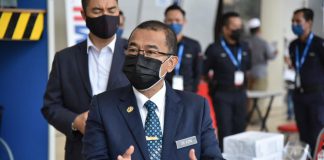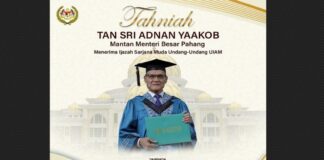SIBU, Sept 6 — A mansion in this town stands as testimony to the historic decision made for Sarawak to gain independence through Malaysia in 1963.
It was at this residence of Tan Sri Ling Beng Siew, president then of the Sarawak Chinese Association (SCA), that several political leaders attended a crucial meeting to determine whether Sarawak should remain a British colony or help form Malaysia as a sovereign and independent nation.
The building stands today as Rumah Malaysia, having been so named on Aug 29, 1983.
The leaders who came together for that meeting almost six decades ago represented SCA; Sarawak National Party (SNAP); Parti Negara Sarawak (Panas); Barisan Rakyat Jati Sarawak (Barjasa) and Parti Pesaka Anak Sarawak (Pesaka).
At the time of the formation of Malaysia, comprising Malaya, Sarawak and Sabah, Sibu was already booming as a timber town. The timber industry had flourished during the 1940s and 1950s.
Sibu’s log production and export started to show a declining trend in 1997 but the town is still producing timber products, though not as much as before.
Dr Gregory Hii Sui Cheng, executive chairman of Delta Leasing Sdn Bhd, said Sibu used to have locally established banks and financial institutions such as Wah Tat Bank, Hock Hua Bank and Kong Ming Bank as well as Chew Geok Ling Finance and Delta Finance.
“But following the 1997 Asian financial crisis, the government merged them with designated major entities to eliminate the structural weakness of the banking sector,” he said.
Sibu is also known for shipbuilding. This business, which started in the 1930s with the supply of wooden boats for river and coastal navigation, flourished in the 1970s and 1980s along with the increase in the export of tropical timber from Sarawak.
It continues to play a key role in the economy.
There are 40 shipyards in Sibu, most of them located at the Rantau Panjang Integrated Shipbuilding Industrial Zone. They produce tug boats for towing logs, barges for carrying logs, anchor handlers, Offshore Support Vessels (OSV), ferries, and express boats for carrying passengers.
The boats built in Sibu are often exported to the neighbouring state of Sabah, Peninsular Malaysia, Singapore, Indonesia and the United Arab Emirates.
The shipbuilding industry generated RM279 million worth of exports for Sarawak in 2018.
Hii and Sarawak Dayak National Union (SDNU) Sibu branch chairman Chambai Lindong concur that Sibu needs to have new economic activities to make it a key contributor to Malaysia’s economy once again.
With an area of 8,278 sq km and a population of 293,514, Sibu has plenty of economic potential yet to be tapped. The vast hinterland it has is suitable for modernised agriculture for production of food that can be exported.
Hii said the economic activities in Sibu are now not confined to the Chinese community but involve the Bumiputeras as well.
“We can now see more and more Dayaks and the Malay/Melanau community involve themselves in business, especially in the opening of coffee shops, which in the past was mainly a Chinese-dominated business.
“This is something really good to see, a reflection of how Sibu people are playing their roles in improving not only their livelihood but the nation’s economy as well,” said Hii.
As the people of Sibu take pride in their achievements, they are delighted that their town has been selected to host this year’s national-level Malaysia Day celebration on Sept 16.
They are waiting with open arms to welcome the scores of federal and state government leaders who are expected to be in Sibu for the celebration.
“We have not had such a big event for some time,” said Chambai as he welcomed the would-be visitors to Sibu and coaxed them to stay “a bit longer” to see Sibu and get to know its people.
“Hopefully this Malaysia Day can be a turning point for Sibu to improve economically and play a greater role towards the development of Sarawak and Malaysia as a whole.
“What it takes is for the leaders to come and see for themselves the areas where they can give the much-needed helping hand to Sibu. After all, in the end, it is for the betterment of the nation,” he said.
— BERNAMA



















